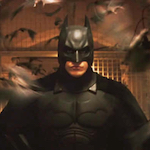 June 15, 2005
June 15, 2005
If there’s a universally agreed-upon absolute banger of a summer blockbuster type movie from 2005, it’s gotta be Christopher Nolan’s BATMAN BEGINS, right? I’ve watched it many more times over the years, it holds up completely, and also seems historically significant as, among other things, a transition point between the ‘90s era of comic book movies and the seemingly endless one we’re in now. It kind of blows my mind that I reviewed it early for The Ain’t It Cool News and here I am two decades later writing more thoughtfully about it for a much smaller (but better) audience. Like a memory cloth cape tailored to fit a rigid skeleton when a current is put through it, time flies.
 I haven’t experienced an era when people weren’t complaining about there being too many sequels and remakes, but I do remember a time before people complained about reboots, because it wasn’t until this movie that I ever heard that term. Nolan’s co-writer David S. Goyer (KICKBOXER 2) used it to explain that they were completely starting the series over. Not a sequel, or a sort of sequel with the same actors playing Alfred and Commissioner Gordon, but a do-over, a totally different take on Batman. I wish that definition had stuck – it’s useless now that it can mean that or a sequel or a remake.
I haven’t experienced an era when people weren’t complaining about there being too many sequels and remakes, but I do remember a time before people complained about reboots, because it wasn’t until this movie that I ever heard that term. Nolan’s co-writer David S. Goyer (KICKBOXER 2) used it to explain that they were completely starting the series over. Not a sequel, or a sort of sequel with the same actors playing Alfred and Commissioner Gordon, but a do-over, a totally different take on Batman. I wish that definition had stuck – it’s useless now that it can mean that or a sequel or a remake.
Nolan’s successful turning on and off of the bat-computer seemed revolutionary in part because his notion of a stripped down, quasi-realistic Batman was so unexpected for the character. The expressionistic movies of former animator Tim Burton had birthed the mega-garish ones by former costume designer Joel Schumacher – the series was synonymous with lavish artifice. BATMAN & ROBIN made money in 1997, but it became so widely hated that many believed it would be the end of Batman movies, and maybe even super hero movies as a whole. Luckily that gave Warner Bros. an opening to consider acclaimed indie directors with drastically different approaches. They tried developing one with Darren Aronofsky (who had only done PI and REQUIEM FOR A DREAM) before they settled on the guy who did FOLLOWING, MEMENTO and (at the recommendation of Steven Soderbergh) INSOMNIA.
BATMAN BEGINS is an introduction to the Nolan we know today – the one who makes movies that feel huge and sweeping, have elaborate story structures that are non-linear but based in an elaborate logic, and brimming with somewhat pretentious ideas that are often said bluntly out loud by characters, yet we’re always in for a purely cinematic experience, never a filmed play. Twenty years later I’m still impressed that he had the inspiration and confidence to, after a brief childhood prologue, introduce us to adult Bruce Wayne (Christian Bale, POCAHONTAS) as a prisoner in a brutal prison in Bhutan, without immediately giving us context. No previous Batman movie ever showed or directly referenced his period of training before becoming Batman, but Nolan and Goyer give us Bruce first planning to assassinate his parents’ murderer (Richard Brake, DEATH MACHINE), then abandoning his life to live among criminals and learn their ways, before being recruited by the mysterious Ducard (Liam Neeson, DARKMAN) to train with the League of Shadows, a ninja clan planning to improve the world through extreme methods that Bruce ultimately rejects.
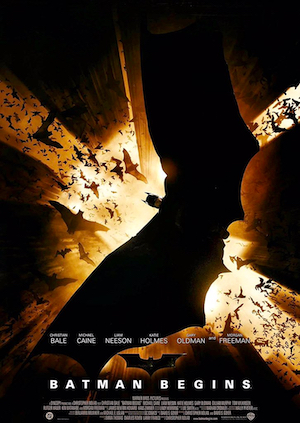 We also witness young Bruce (Gus Lewis, ASYLUM) being traumatized by a fall into a cave full of bats (similar origin to CUJO), see how his father (Linus Roache, THE CHRONICLES OF RIDDICK) and butler Alfred (Michael Caine, GET CARTER) try to support him, and why he blames himself for his parents’ deaths. In pure Nolan fashion the different threads and time periods swirl in and out of each other, sequenced not by chronology but by idea. What order these events happened in takes a back seat to what realizations they lead to.
We also witness young Bruce (Gus Lewis, ASYLUM) being traumatized by a fall into a cave full of bats (similar origin to CUJO), see how his father (Linus Roache, THE CHRONICLES OF RIDDICK) and butler Alfred (Michael Caine, GET CARTER) try to support him, and why he blames himself for his parents’ deaths. In pure Nolan fashion the different threads and time periods swirl in and out of each other, sequenced not by chronology but by idea. What order these events happened in takes a back seat to what realizations they lead to.
One of the obvious motifs is fear: in Bruce’s phobia, Ducard’s philosophies of control, Jonathan “The Scarecrow” Crane (Cillian Murphy, RED EYE)’s experiments, and the reason for the Batman persona. Traditionally the bat costume is meant to scare criminals; here it also represents Bruce facing his own fear. As I’m listing these examples it seems heavy-handed, but I think it works exactly right for the movie, the perfect fusion of Nolan’s professorial shtick and Goyer’s comic book bullshit. It all comes together in one of the movie’s most beautiful moments, when Bruce discovers the caves under Wayne Manor, is swarmed by bats, and is now able to stand serenely among them with his eyes closed – Batman’s version of that cliche SHAWSHANK REDEMPTION type shot, looking up into the rain.
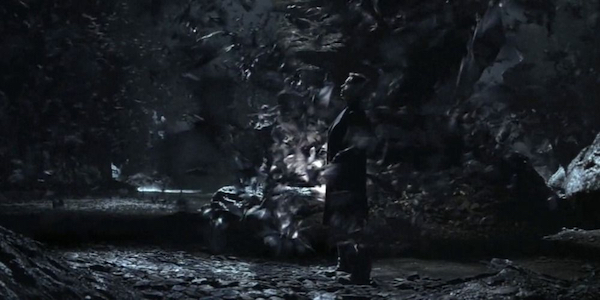
Looking at this still image I realize that okay, half of the power of that scene is the score by Hans Zimmer (BROKEN ARROW), who is credited alongside James Newton Howard (FALLING DOWN) with additional music by Ramin Djawadi (BLADE: TRINITY), Lorne Balfe (MIMIC 3: SENTINEL) and Mel Wesson (SPIRIT: STALLION OF THE CIMARRON). The two primary composers supposedly represent the two sides of Bruce Wayne, with Howard focused on drama and Zimmer on action. According to the website promoting Zimmer’s MasterClass, “The Batman score motif is just two notes, repeated. It leaves the listener with an unfinished, unsettled feeling… It’s a short phrase that contains the entire character of Batman/Bruce Wayne.” I don’t know about all that but it’s such an effective style it replaced the old PIRATES OF THE CARIBBEAN Zimmer sound as the main one he does now.
Once Bruce returns to Gotham it gets into more expected origin story stuff (making the costume, building the Batcave, finding the Batmobile), but the different context and clever details make it thrilling. I mentioned in my review of UNLEASHED how much audiences loved Morgan Freeman at this time, and that carries into BEGINS’ brilliant idea of casting him as Lucius Fox, a character previously unknown to non-comics people, but seeming at least as important as Alfred or James Gordon (Gary Oldman, THE FIFTH ELEMENT). I love the idea of the famous bat-gadgets coming from a DARPA-like research department of Bruce’s company that has been neglected by the current CEO (Rutger Hauer as a character pretending to be less loathsome than the one he played in SIN CITY). It’s weird though that Lucius seems to be the only person who works there. Of course I also enjoy the running gag of the two talking around what he’s using this stuff for. Plausible deniability.
I never really like the look of Batman in full-on armor, but by making parts of it translucent so we can see the interior before it’s painted they really make me believe that stuff is heavy duty. Of course my favorite detail will always be how the three spikes on his gloves (introduced in Detective Comics #36, possibly inspired by illustrations of a pulp character called The Black Bat) are explained as hooks on ninja gauntlets which can be used for blocking swords or climbing mountains. I’m personally all for doing things in movies just because they look cool, but there’s also an appeal to this feeling that every single detail of the world has a purpose.
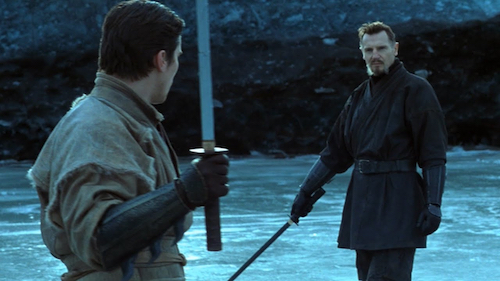
Alfred contributes to the operations too. He’s the one who suggests buying the Chinese-imported masks by the ten-thousand with ear pieces purchased separately to avoid tracing. He’s also the one who tells us the secret freight elevator into the caves below Wayne Manor is a remnant from the underground railroad. Twenty years ago more people believed in the concept of benevolent billionaires – they were mostly seen as philanthropists rather than today’s bizarre nazi freaks openly scheming to ruin everybody’s lives. But I appreciate that Nolan and Goyer saw the importance of establishing the Wayne family as particularly kind people dedicated to fighting poverty, building public transit, freeing slaves. Historic good guys.
Katie Holmes (DISTURBING BEHAVIOR) as Bruce’s childhood friend Rachel gets the difficult job of speaking up for the Thomas Wayne legacy and seeking justice through the system (man that’s harsh when she slaps Bruce two times then tells him his father would be ashamed of him). I think she’s the only cast member who doesn’t quite overcome the cumbersome monologue she’s given, and there’s some retroactive weirdness from the character being recast in the sequel (by her choice, apparently). But I still think she works pretty well. If she’s the biggest weak spot that’s a sign that this is a good movie.
Oh yeah, I suppose I should mention that Ken Watanabe (two years after THE LAST SAMURAI, a year before LETTERS FROM IWO JIMA) is pretty much wasted as the decoy R’as Al Ghul. He looks cool and he gets to make one self righteous speech, but you’d never know they hired a great actor here if you’d only seen him in this. Luckily 1) it’s funny to consider what a shitty job it is to just sit on a throne with nothing to do but very occasionally pretend to be the boss in front of the actual boss and then be killed in a short sword fight b) Nolan later gave him more to do in INCEPTION.
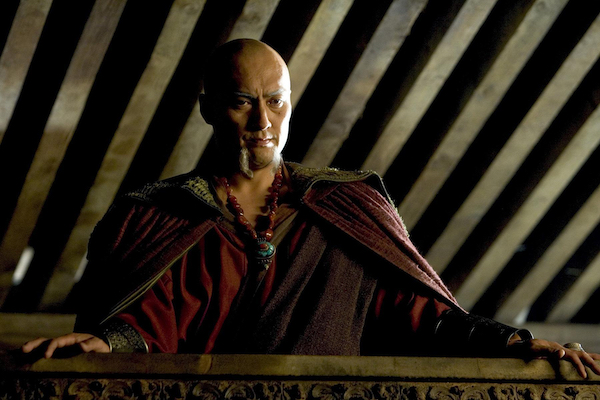
As familiar as I’ve stayed with BATMAN BEGINS, a few things struck me on this rewatch. Even more than I remembered this has a ton of jokes, even corny ones, for a movie (and director) with a reputation for alleged humorlessness. We still think of it as a very serious movie because it comes from characters being funny, never making light of this world or its stakes. I thought of a running gag they could’ve done that would’ve tipped it, though. After the scene where Ducard demonstrates “invisibility” by revealing that there has been a ninja hanging from the ceiling unseen, there could be a series of unremarked-upon incidents where ninjas lower down to light his cigarette, dab his mouth with a napkin, etc.
Another thing that really jumped out at me was the fast pace of the editing – the way Nolan fits in so much material by jumping quickly out of one scene into the next. It skips through the timeline so much but not at the expense of momentum. This was the first Nolan movie for editor Lee Smith (DEAD END DRIVE-IN, HOWLING III: THE MARSUPIALS, ROBOCOP 2, THE TRUMAN SHOW), but he’s done five more since then.
I know some people make fun of the raspier voice Bruce takes on to disguise himself when he’s Batman. It’s always worked for me so I didn’t think about it much during this viewing, but I did notice that it’s pretty much the same voice Bale uses in HOWL’S MOVING CASTLE when he becomes a demon.
My biggest misgiving about the movie back in the day was the aesthetics of the fight scenes. The movie credits fight consultants Andy Norman and Justo Dieguez, who are both certified Jeet Kune Do instructors under Dan Inosanto, but more importantly are creators of a self defense system called the Keysi Fighting Method (or KFM). According to World of Martial Arts, KFM “was a style that was developed based on experiences of Justo growing up and working in the Spanish mines and Andy Norman’s rich experience in the martial arts and violence in the streets of Britain.” It’s supposedly good for close quarters combat with multiple attackers. Black Belt Magazine says the goal of KFM was to create “a fighting system that was grounded in reality rather than sport or tradition… a practical, no-nonsense approach to self-defense that would be effective in unpredictable and chaotic street fights.” That Nolan recruited these guys confirms that his instinct was to find what might be the most real world effective way for Batman to fight instead of the coolest way.
Norman was brought in to audition as a ninja, but apparently impressed stunt coordinator Paul Jennings (THUNDERBIRDS) and fight arranger David Forman (Leonardo in TEENAGE MUTANT NINJA TURTLES) with his demonstration of fighting techniques. KFM’s inclusion in the movie exploded the popularity of the system. The founders later split into two different methods, Keysi by Justo and Defence Lab. Norman trained Tom Cruise for MISSION: IMPOSSIBLE III and created the fighting style for JACK REACHER, and Neeson thought well enough of him to do a promo video for Defence Lab. Now that I think about it, BATMAN BEGINS might’ve had as much of an influence on the “CIA guys know these certain moves they can use to beat up anybody” philosophy of movies like TAKEN and THE EQUALIZER as THE BOURNE IDENTITY did. Maybe.
Despite my crusade for action clarity, I understood why Nolan wanted something closer to a real street fight than a Shaw Brothers movie or THE MATRIX, why a flurry of close up swings might capture the experience of being a thug facing Batman better than smooth, carefully framed movements. At the same time, good sir, did you not give us a Batman trained by a ninja clan? And then build to a dramatic moment when he must battle them all in a burning temple? And then just have brief, chaotic skirmish followed by sliding down a mountain?
Oh man, what I wouldn’t do for this exact movie infused with a couple modern JOHN WICK or THE VILLAINESS level action set pieces. Does the “theatricality” that’s a “powerful agent” not include doing some awesome fight moves? I still think it should, but I’ve accepted that this is not that type of movie. I can stand calmly as the fights fly past my face. It doesn’t bother me anymore.
Goyer recently talked about the anniversary of BEGINS on the podcast Happy Sad Confused, and he explained the thinking behind the burning temple scene. “We just said, ‘Pretend Bruce Wayne is James Bond, or Indiana Jones, or whomever.’ If we can do a sequence that is just incredible and heart-pounding, and he doesn’t have the mask on, then people won’t care whether or not he has the mask on.”
Which is funny because I like the scene for the whole idea of it, but it never would’ve occurred to me that it was trying to be RAIDERS OF THE LOST ARK good! Nolan has definitely gotten better at that sort of thing over the years. What he was already great at, though, was the vehicle action. Another bit of Nolan counterintuitive brilliance was replacing the beautiful curves of previous Batmobiles with a rugged, jagged street tank. The Tumbler was imagined by Nolan as a cross between a Humvee and a Lamborghini (yeah, I can see it). He and production designer Nathan Crowley (BEHIND ENEMY LINES) designed it by kit-bashing models, and it was built by Chris Corbould, who is best known for creating the practical effects for James Bond movies from A VIEW TO A KILL to SPECTRE. The cars were 15 feet long, 9 feet wide, built from scratch to be sturdy so they could really do the stunts (though they weren’t at all bullet proof). Because they could go 100 mph the camera truck had problems keeping up. A 20% miniature was used for most of the jumping scenes, but reportedly a full sized one could jump 30 feet and was used for the waterfall scene.
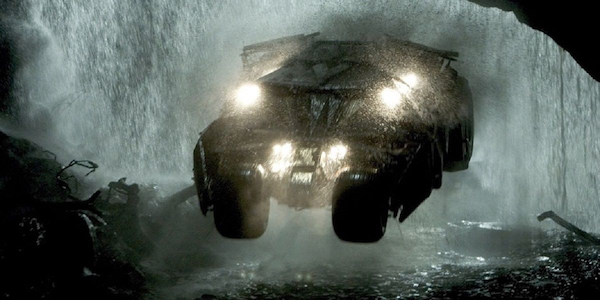
Though Nolan later topped it in THE DARK KNIGHT, the Tumbler chase through the streets and over the roof tops of Gotham (Chicago) is still a joy to watch. The sequel has largely overshadowed the original in pop culture (and even in my mind), but I never get tired of revisiting BATMAN BEGINS, and (as sometimes happens in these retrospectives) the anniversary is activating a little nostalgia in me. I remember how exciting it was, after years of being needlessly aggrieved by the previous two Batman movies, that they actually managed to make one that was original and great and that I loved in a totally different way than I loved the Burton ones. I remember that I was able to see it at an early promotional screening, and as much as I was loving it, for most of the movie I didn’t know if that would translate to normal people. Maybe they’d think it was boring that it spent so much time digging into Bruce Wayne pre-Batman? But the silence of the audience was broken at the end, when Gordon shows Batman the Joker card – one of those spontaneous explosions of enthusiasm that can’t be forced. And I remember filing out of the theater with everyone buzzing, saying things like “I’m gonna see that again in Imax!” (Yep, Nolan was already pushing the “best seen in Imax.”)
Batman’s beginning was also the beginning of Nolan’s career as we know it today. The indie guy who got to do the Batman movie became the guy doing the Dark Knight trilogy, but afterwards he did not have to become the guy they hire for stuff. He somehow obliterated the notion of “one for them, one for me,” because his movies since then have only been bigger, but never more commercial, often less. He has been able to be a name brand big budget blockbuster director but not an “i.p.” or franchise guy, coming up with his own weird ideas like INCEPTION and TENET and not even sequelizing them. His biggest “one for me” was an R-rated scientist biopic that made $975 million and won the Oscars for best picture, director, cinematography, editing, score, supporting actor, and actor (for the Scarecrow).
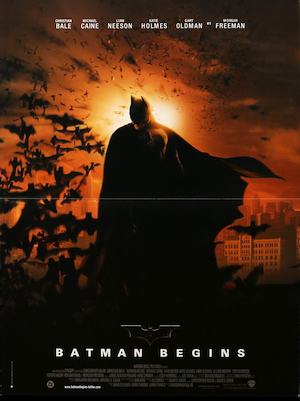 BATMAN BEGINS was so good it changed everything. It did pretty well, got more popular on video, then the sequel was a smash. A precedent was established that super heroes could be treated seriously and appreciated by anyone regardless of nerdiness levels. Without this movie would Paramount, or audiences, have given IRON MAN a chance to establish the new super hero formula, kicking off the MCU? And if not, does Nolan now feel like Oppenheimer?
BATMAN BEGINS was so good it changed everything. It did pretty well, got more popular on video, then the sequel was a smash. A precedent was established that super heroes could be treated seriously and appreciated by anyone regardless of nerdiness levels. Without this movie would Paramount, or audiences, have given IRON MAN a chance to establish the new super hero formula, kicking off the MCU? And if not, does Nolan now feel like Oppenheimer?
Either way, it’s a prime example of a model we seem to have largely lost in the modern age: the auteurist super hero movie. THE AVENGERS made connected universes the goal of every studio, and I do think those can be fun, but they’re the opposite of what Nolan achieved here, designing a world around one character and story. There was never any chance of another director continuing the series after his trilogy, and even when he agreed to produce MAN OF STEEL he was very clear that no, this does not take place in the world of Batman, we are focused on this other story about Superman. Calm down.
I must confess that I have an obsession with Batman. It was the 1989 movie that kicked it off, so I generally think of him in that Tim Burton context of the artist’s super hero, the dramatic motherfucker expressing his issues through theming, his psyche mirrored by various weirdo villains striking out in a menacing, shadowy landscape, little smears of color streaking across the night sky. So it’s a feat that Nolan can strip most of that away from his version of Batman and still have me 20 years later agreeing it’s One of the Great Movies. And although many movies (CASINO ROYALE, DRACULA UNTOLD) aspired to follow in its reboot footsteps, the recipe was hard enough to duplicate that it never felt like there were a bunch of copycats out there. I don’t watch this thinking “Well, this was the first time they did something like this, maybe you had to be there.”
So there it is, a singular movie of 2005, but basically timeless. A classic of the form that will spawn a masterpiece of the form. A lucky break, an opportunity taken, a successful merging of the high minded and the pulpy. The beginning of something great, but not to be repeated. If you want to make the next BATMAN BEGINS, you’ll have to hit control-alt-delete, open up a blank document, and get climbing.
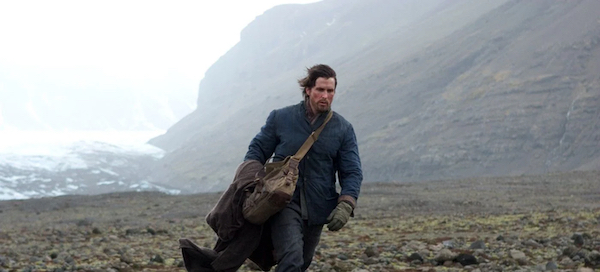
* * *
tie-ins: There was, of course, various merchandise, though not like in ’89. There was a “stealth action-adventure” video game “incorporating both beat ‘em up and stealth elements.” Bale, Caine, Neeson, Holmes, Murphy, Freeman, Watanabe and others provided voices, but not Oldman (who was replaced by Gavin Hammon).
Action figures include “Ninja Bruce to Batman,” a stylized Bale Bruce Wayne with a bat-torso that slides over him…
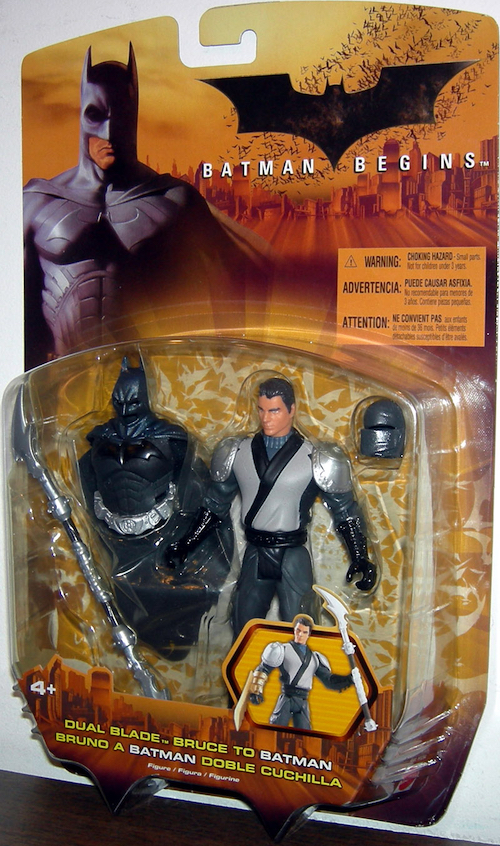
…and a Ducard who I think looks like a hybrid of Martin Scorsese, Al Pacino and Robert DeNiro. I guess this is before they started scanning actors’ faces with lasers or whatever.
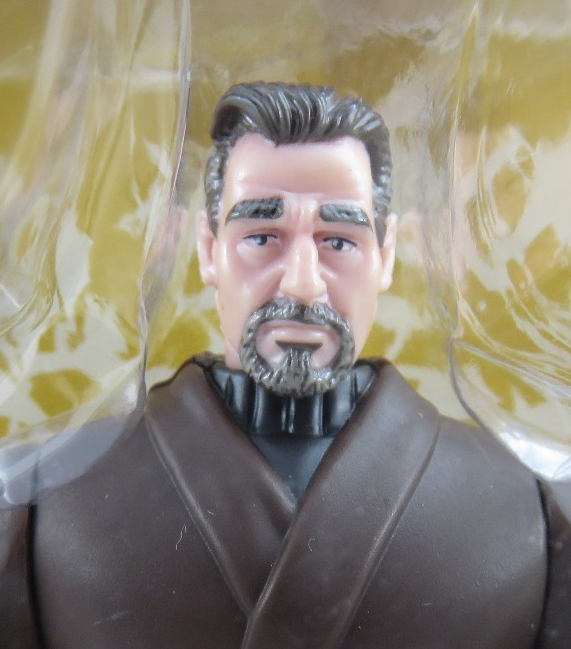
Special supplement – action guys who are in this:
Tom Wu (BELLY OF THE BEAST), Stuart Ong (IN THE LINE OF DUTY III), Chike Chan (OUT FOR A KILL), Jamie Cho (LARA CROFT: TOMB RAIDER – THE CRADLE OF LIFE), Martin McDougall (SUBMERGED), Roger Yuan (AMERICAN KICKBOXER, THE PERFECT WEAPON, RAGE AND HONOR, RING OF STEEL), Andrew Pleavin (UNSTOPPABLE), Spencer Wilding (later in GREEN STREET 3 and Darth Vader in ROGUE ONE), Dean Alexandrou (THE PROTECTOR), Joey Ansah (later in THE BOURNE ULTIMATUM and THE OLD GUARD), Jon Foo (later the star of BANGKOK REVENGE), Mark Strange (THE VAMPIRE EFFECT).


























June 19th, 2025 at 2:22 pm
This is good, and pretty spot-on, except for
BATMAN BEGINS is an introduction to the Nolan we know today
Which I wish was true, but unfortunately I think that honor belongs to The Prestige. Which was the genesis of of his weird obsession with making three-hour trailers (never more than 40 frames without a cut, incessant and booming score, constant cross-cutting. Y’know, the modern movie trailer)
It did begin his obsession with large format (wb even held the press screening at the massive Lincoln square imax. Which was really odd at the time. And as it turned out, a very wise move. It’s not everyday you see auditorium full of jaded, surly, ny film critics cheer and geek the fuck out). Unfortunately, it was also his last movie to actually utilize the format well, since he barely leaves images on the screen long enough to register on a normal-sized movie screen.
(After seeing both Dark Knight and Inception in imax, I found it very striking how neither I, nor the people I was with, could remember large swaths of what we just saw, immediately after seeing it. Weirder still, our largest lapses of memory were of the final 30-40 minutes, which would of been the most recent events. I could only deduce that out eyes and brains became exhausted by trying to take in so much, so quickly, and they just gave up. After Dark Knight, I literally asked “Was Tiny Lister in that?” and no one was sure. We couldn’t even figure out if aaron eckhart died)